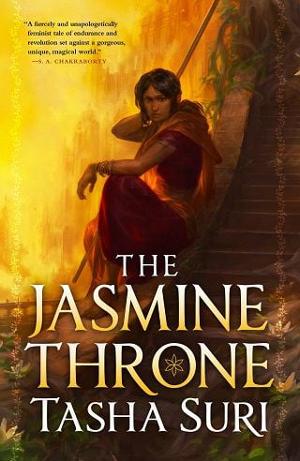Chapter 2: Malini
MALINI
The night before they were due to reach Ahiranya, Malini was not given her usual medicine. There was nothing in the wine Pramila handed her to drink before she slept—no aftertaste of cloying sugar that signaled she had been dosed with needle-flower.
“You will need to be alert when you meet the regent,” Pramila told her. “Alert and polite, princess.”
The words were a warning.
Malini did not know what to make of the new clarity of her mind. Her skin felt too tight over her bones. Her heart—finally allowed the freedom to grieve without the blanket of needle-flower to smother it—was a heavy throb in her chest. She felt as if her ribs ached with the weight of it. She crossed her arms around herself, and felt each indent, each hollow. Counted them.
After weeks muted by the needle-flower, the world was a painful ricochet of sensation. Everything was too loud, too hard, the light of the day too painful. The jolt of the carriage made her joints hurt. She was a sack of flesh and blood.
For once, she couldn’t drown out Pramila’s reading of the Book of Mothers. Pramila sat next to her in the carriage, stiffly upright, reciting with painstaking slowness. First, Divyanshi’s childhood. Then, the crimes of the yaksa and their terrible devotees, the Ahiranyi. Then, the ancient war. Then, how it ended.
Then, the book closed, and turned. And reopened, and repeated over again.
It made her want to scream.
She kept her hands still and calm in her lap. Maintained the measure of her own breath.
She was an Imperial Princess of Parijatdvipa. Sister to the emperor. She had been named at the feet of a statue of Divyanshi haloed in flame and flowers. Garland weaver, they’d called her. Malini.
She had woven her first crown from roses shelled from their thorns, as her mother had taught her the words of the Book of Mothers with far more sweetness and verve than Pramila’s dry voice could ever muster.
The mothers ended their lives willingly in holy fire. Their sacrifice was an old, deep magic that lit the weapons of their followers with flame and set the monstrous yaksa alight.
That was the point in the book when her mother had often pretended to wave a sword in front of her, bringing the tale some much-needed levity. Malini had always laughed.
Their sacrifice saved us all. If not for the mothers, there would be no empire.
If not for the mothers’ sacrifice, the Age of Flowers would never have been brought to an end.
Sacrifice.
Malini looked out of the chariot at the land of Ahiranya. The air smelled wet and rich from rainfall. The thin curtain surrounding her concealed nearly everything, but through the gap that billowed with the movement of the wheels she could see the shadows of cramped buildings. Empty streets. Broken trees, splintered by axes, and the charred remains where some had been burned away entirely.
This was the nation that had almost conquered the entirety of the subcontinent in the Age of Flowers. This was what remained of a once great power: a dirt track so uneven that the chariot jolted violently every few seconds, a few shuttered stalls, and scorched earth.
And Malini had not seen a single brothel yet. She was oddly disappointed to realize that all those highborn boys who had boasted to her brothers about being able to bed a dozen women the moment you set foot in Ahiranya for the price of a single Parijati pearl had been grossly exaggerating.
“Princess Malini,” said Pramila. Her mouth was thin. “You must listen. It is your brother’s will.”
“I always listen,” Malini said evenly. “I know these tales. I was properly raised and taught.”
“If you remembered your lessons, neither of us would be here.”
No, thought Malini. I would be dead.
She turned back to Pramila, who still held the book open on her knees, the pages pinned flat by her fingers. Malini glanced down, identifying the page, and began her own recitation.
“ ‘And Divyanshi turned to the men of Alor who served the nameless god above all others, and the men of Saketa who worshipped fire, and said to them, offer my son your sworn loyalty, your unbreakable vow, and his sons after him. Unite with my beloved homeland, in one dvipa, one empire, and my sisters and I will raze the yaksa from the earth with our honorable deaths.’”
She paused, considering, then said, “If you turn to the next page, Lady Pramila, there’s a very fine illustration of Divyanshi lighting her own pyre. I am told I look a little like her.”
Pramila slammed the book shut.
“You’re mocking me,” she snapped. “Princess, do you have no shame? I am trying to help you.”
“Lady Pramila,” a voice called. Malini heard the clatter of horses’ hooves as a figure drew nearer. “Is there anything amiss?”
Malini lowered her eyes. She saw Pramila’s grip tighten on the book.
“Lord Santosh,” said Pramila, voice like honey. “Nothing is amiss. I am merely instructing the princess.”
Santosh hovered, clearly wanting to involve himself.
“We will reach the regent’s mahal soon,” he said, when Pramila remained silent. “Make sure the princess is prepared.”
“Of course, my lord,” Pramila murmured.
His horse drew away.
“See what happens when you misbehave?” Pramila said quietly. “You want him to report your childishness to your brother? Would you like to see more punishments rained down upon us?”
What more could her brother possibly do to her than he had?
“I still have other children,” Pramila said. Her fingers were trembling faintly. “I would like to see them live. If I must make you behave…” She let the threat, half-formed, hang in the air.
Malini said nothing. Sometimes apologies only served to inflame Pramila’s anger further. An apology, after all, could not right any wrongs. Could not bring back the dead.
“Double your dosage tonight, I think,” Pramila announced, opening the book once more.
Malini turned her ear to Pramila. Heard the sound of the book cracking open; the rasp of fingers against the pages. The drone of Pramila’s voice.
This is what a pure and holy woman of Parijat can accomplish, when she embraces immortality.
Malini counted the shadows of the soldiers through the curtain. Lord Santosh’s figure was hunched over his horse, a parasol held over his head by an obedient lackey.
She thought of all the ways she would enjoy seeing her brother die.
 Fullepub
Fullepub 



